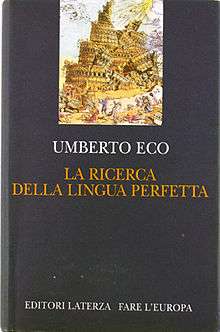La Ricerca della Lingua Perfetta nella Cultura Europea

La ricerca della lingua perfetta nella cultura europea (English: The Search for the Perfect Language in the European Culture; trans. James Fentress) is a 1993 book by Umberto Eco on a relatively marginal theme in the history of ideas. The writing is essayistic and uses the myth of Babel as a paradigm for connecting the linguistic and social practices. Emphasizing that the quest for a perfect language has never been devoid of ideological motivation, Eco outlines some counterarguments to the idea and suggests that an International Auxiliary Language is a more realistic project. He points that the impossible quest has had some useful side effects (taxonomy, scientific notations etc.) but dwells mostly on exotic proposals. Lengthy passages are devoted to Dante, Lull, Kircher, various 17th century authors and a few less known names from later times. The contemporary project for a politically and culturally unified Europe provides the perspective for a more serious consideration of the theme.
Contents
- From Adam to Confusio Linguarum
- The Kabbalistic pansemioticism
- The perfect language of Dante
- The Ars Magna of Raymond Lull
- The Monogenetic Hypothesis and the Mother Tongues
- Kabbalism and Lullism in Modern Culture
- The Perfect language of Images
- Magic language
- Polygraphies
- 'A priori' philosophical languages
- George Dalgarno
- John Wilkins
- Francis Lodwick
- From Leibniz to the Encyclopédie
- Philosophical Language from the Enlightenment to Today
- The International Auxiliary Languages
- Conclusion
English Editions
- Blackwell Publishing Limited (1995) ISBN 0-631-17465-6.
- Fontana Press (1997), ISBN 0-00-686378-7.